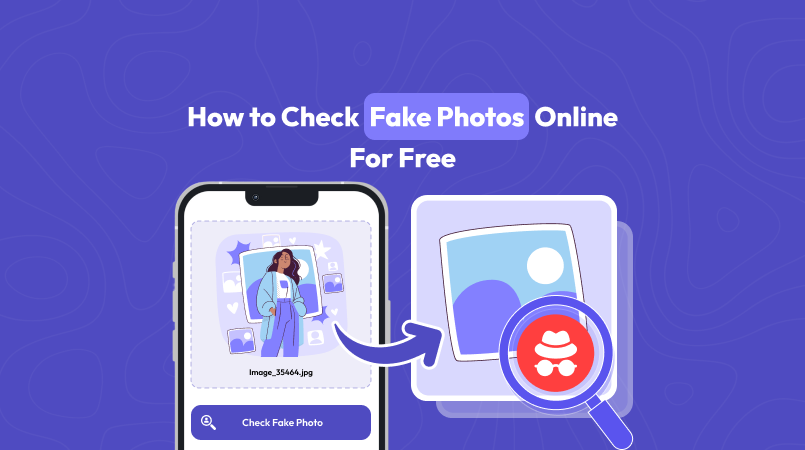
As more & more fake, misleading photos flood our feeds, images in their most basic form have become impossible to trust.
Anyone can create amazing fake images in moments, thanks to artificial intelligence. And the spread of misinformation is apparent everywhere you look.
So, how do you authentically spot fake photos? Today, we’re sharing what we believe are the 6 best free methods to check fake photos online & how to protect yourself from misinformation.
Use Reverse Image Search
Reverse image search is the most powerful resource in your toolkit.
Here’s how you can do it:
- Go to Google Images & click the camera icon in the search bar.
- Upload the photo or paste its link.
- Review the results to see if the image has been used elsewhere.
This method is effective for spotting stolen images.
Inspect Metadata
Expert internet users know that Metadata is one of the best ways to check fake photos.
To view metadata:
- On a computer, right-click the image & select “Properties” or “Get Info.”
- Look for the “Details” tab to see the metadata.
If the metadata is missing or doesn’t match the story behind the photo, it’s a major RED FLAG.
Look for Visual Clues
You can train your eye to spot fake images without any tools at all. Yes, that’s true!
Let’s look at some key visual clues:
- Inconsistent Lighting & Shadows
- Strange Blurring or jagged edges around objects.
- Unusual Perspective or proportions that don’t make sense
- Pixelation or quality differences in parts of the same image
- Reflections that don’t align with the environment
- Faces that look perfect but slightly off
This list can help you recognize AI manipulation.
Use Fake Photo Detection Tools
So many people fall for fake photos because they don’t know about free detection tools. Some even think these tools are too complicated to use.
Start using them because photo verification is not about being a tech expert.
In fact, these tools are super easy to use.
Some popular options include:
- Fakeimagedetector.com
- Fotoforensics.com
- Fakeimagedetector.net
Check Context & Credibility
When examining a suspicious photo, you need to ask these questions:
- Who shared the photo? Is it from a reputable news outlet or a random social media account?
- Is the source trustworthy? Verify the website or platform where the image was posted.
- Does the story make sense? If the photo seems too unbelievable, it might be fake.
Crowdsourced Fact-Checking
You have to benefit from the power of the crowd to verify suspicious images.
How?
Show people that you:
- Care about the truth
- Are reliable with information
- Verify before you share
One of the best ways to do that is to use crowdsourced fact-checking platforms.
Skip the immediate sharing and reactions! When you see a suspicious photo, check these resources first! Better yet, reach out to experts and ask for verification.
Use these real, established fact-checking services:
Subreddits like r/RBI or r/PhotoshopRequest can help you analyze photos.
- Snopes
This website specializes in debunking myths & fake stories, including photos.
- Fact-Checking Websites
Platforms like FactCheck.org or AFP Fact Check provide reliable information on viral images.
Conclusion
In order to be successful in any online environment, you need to be unattached to the emotional impact of photos. It would be best to commit yourself to the verification process. Fake photos are everywhere, but with these six free methods, you can learn to spot them. Stay curious & use these techniques to separate fact from fiction.

Factsinsight.com is a leading blog that focuses on creating high quality, interesting and useful content about technology. We are a group of experienced writers who know a lot about the world of tech and love to stay abreast of the latest trends and developments. Our aim is to give useful and real knowledge to our people.
